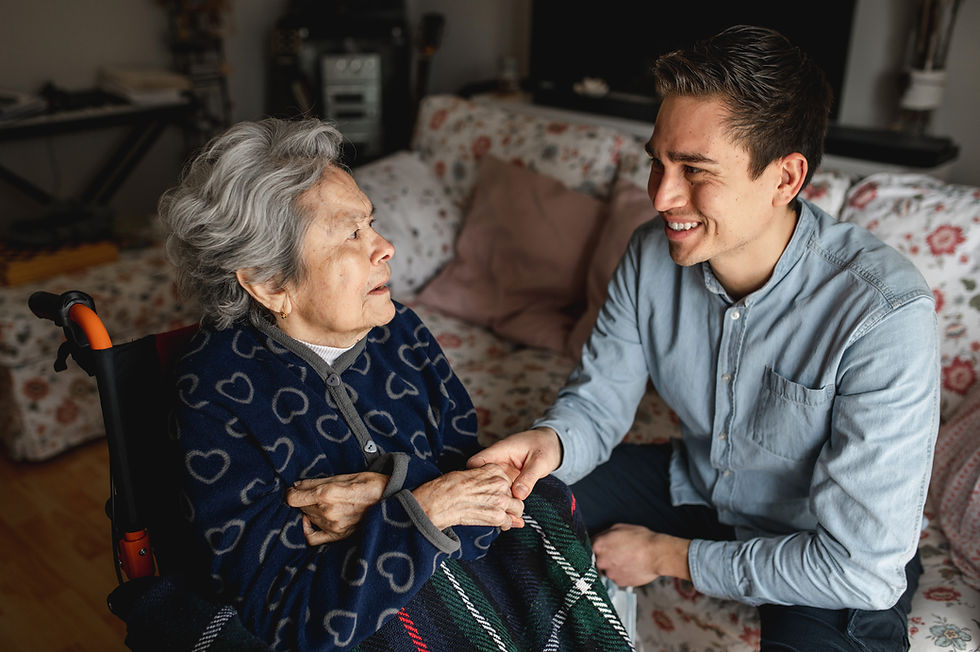A Dementia Diagnosis: What to Do Next
- linsey406
- Sep 24, 2025
- 4 min read

Hearing the words “You have dementia” can feel overwhelming — whether you’ve just received the diagnosis yourself or it’s a loved one facing this new reality. Dementia is not a single disease but a general term describing a group of symptoms that affect memory, reasoning, communication, and the ability to perform daily activities. While it can feel frightening and uncertain, there are important steps you can take right away to ensure the best quality of life and future planning.
1. Learn About the Diagnosis
Not all dementias are the same. Alzheimer’s disease is the most common type, but there are several others. Understanding the type of dementia can help guide treatment, planning, and expectations.
Common Types of Dementia
Alzheimer’s Disease-The most common form, accounting for 60–70% of cases. It typically begins with memory loss and progresses to difficulties with language, reasoning, and daily functioning.
Vascular Dementia-Caused by reduced blood flow to the brain, often after strokes or small vessel disease. Symptoms may include slowed thinking, difficulty with organization, and trouble with balance.
Lewy Body Dementia-Associated with abnormal protein deposits in the brain. It often includes visual hallucinations, sleep disturbances, and movement symptoms similar to Parkinson’s disease.
Frontotemporal Dementia (FTD)-Affects the frontal and temporal lobes of the brain. Symptoms are often changes in personality, behavior, and language, sometimes appearing earlier in life than other dementias.
Mixed Dementia-Many people experience more than one type, such as Alzheimer’s combined with vascular dementia. This can complicate diagnosis and symptoms.
Other, Less Common Forms-Conditions like Parkinson’s disease dementia, Huntington’s disease, or Creutzfeldt-Jakob disease also fall under the dementia umbrella.
2. Create a Care Team
Managing dementia is not something anyone should do alone. A strong support system makes a world of difference.
Primary care doctor and specialists: A neurologist or geriatrician may help guide treatment.
Family and friends: Involve loved ones early so everyone is on the same page.
Professional support: Social workers, care managers, or home care providers can offer guidance and hands-on assistance.
3. Address Legal and Financial Planning Early
It may feel uncomfortable to talk about legal documents, finances, and future care right after a diagnosis, but acting early is one of the most loving steps you can take. Dementia is progressive, meaning decision-making abilities will decline over time. Planning while the person is still able to participate ensures their wishes are heard and respected — and it helps avoid confusion or conflict later on.
Why Early Planning Matters
Clarity: Families know exactly what their loved one wants.
Peace of mind: Legal documents reduce the stress of guessing about medical decisions or money management.
Financial preparedness: Dementia care is costly. Early planning helps protect assets and ensures access to needed care.
Essential Legal Documents
Advance Healthcare Directive (Living Will): Outlines preferences for medical care, including life-sustaining treatments, pain management, and end-of-life wishes.
Healthcare Power of Attorney (POA): Appoints a trusted person to make medical decisions when the individual is no longer able.
Durable Financial Power of Attorney: Gives someone authority to manage finances, pay bills, file taxes, or make investment decisions on behalf of the person with dementia.
Will or Trust: Clarifies how assets will be distributed and, in some cases, helps avoid probate.
💡 Tip: Work with an elder law attorney. They specialize in these documents and understand Medicaid, long-term care planning, and asset protection strategies.

Financial Planning for Care
The cost of dementia care can be significant. According to the Alzheimer’s Association, the lifetime cost of care for someone with dementia averages more than $390,000, with families shouldering about 70% of the expense. Planning ahead helps reduce financial strain.
Insurance Review: Understand what’s covered under Medicare, supplemental insurance, or long-term care insurance policies.
Care Costs: Compare in-home care, adult day services, assisted living, and memory care communities. Each has different pricing structures.
Medicaid Planning: For families with limited resources, early planning may help preserve assets while still qualifying for government assistance later.
Budgeting for the Long Term: Consider both current needs (doctor visits, medications) and future needs (24-hour supervision, nursing care).
Family Conversations
Money and legal planning can be sensitive topics, but open communication is essential.
Schedule a family meeting to discuss the diagnosis and share responsibilities.
Assign roles: One person may be better suited to handle finances, another for daily care, and another for coordinating medical needs.
Use professionals as neutral guides, such as a financial planner or elder law attorney, to reduce tension.
Organizing Important Information
Keep all critical documents in a safe but accessible place. Create a binder or digital folder that includes:
Bank and investment account details
Insurance policies
Mortgage, property, or debt information
Passwords for online accounts
Contact list for doctors, attorneys, and financial advisors
4. Explore Treatment and Lifestyle Options
While there’s no cure for dementia, some treatments and lifestyle approaches can help manage symptoms and slow progression.
Medications: Certain drugs may help with memory, mood, or behavior.
Healthy lifestyle habits: A balanced diet, physical activity, social connection, and cognitive stimulation can all improve quality of life.
Supportive therapies: Speech therapy, occupational therapy, or counseling may help both the individual and their caregivers.
5. Build a Support Network for Caregivers
Caring for someone with dementia can be both meaningful and exhausting. Caregivers need support just as much as those living with the condition.
Join a support group (online or in person) to connect with others going through the same journey.
Schedule respite care so caregivers can rest and recharge.
Seek professional counseling if the emotional weight becomes too heavy.
6. Focus on Living in the Present
A dementia diagnosis does not erase a person’s identity or their ability to enjoy life.
Celebrate abilities that remain rather than focusing only on what is lost.
Maintain familiar routines to provide comfort and stability.
Prioritize joy and connection, whether that’s sharing music, looking through photos, or simply spending time together.
A dementia diagnosis is life-changing, but it does not mean life stops. With preparation, support, and a focus on what matters most, families can navigate this journey with dignity, compassion, and resilience.



Comments